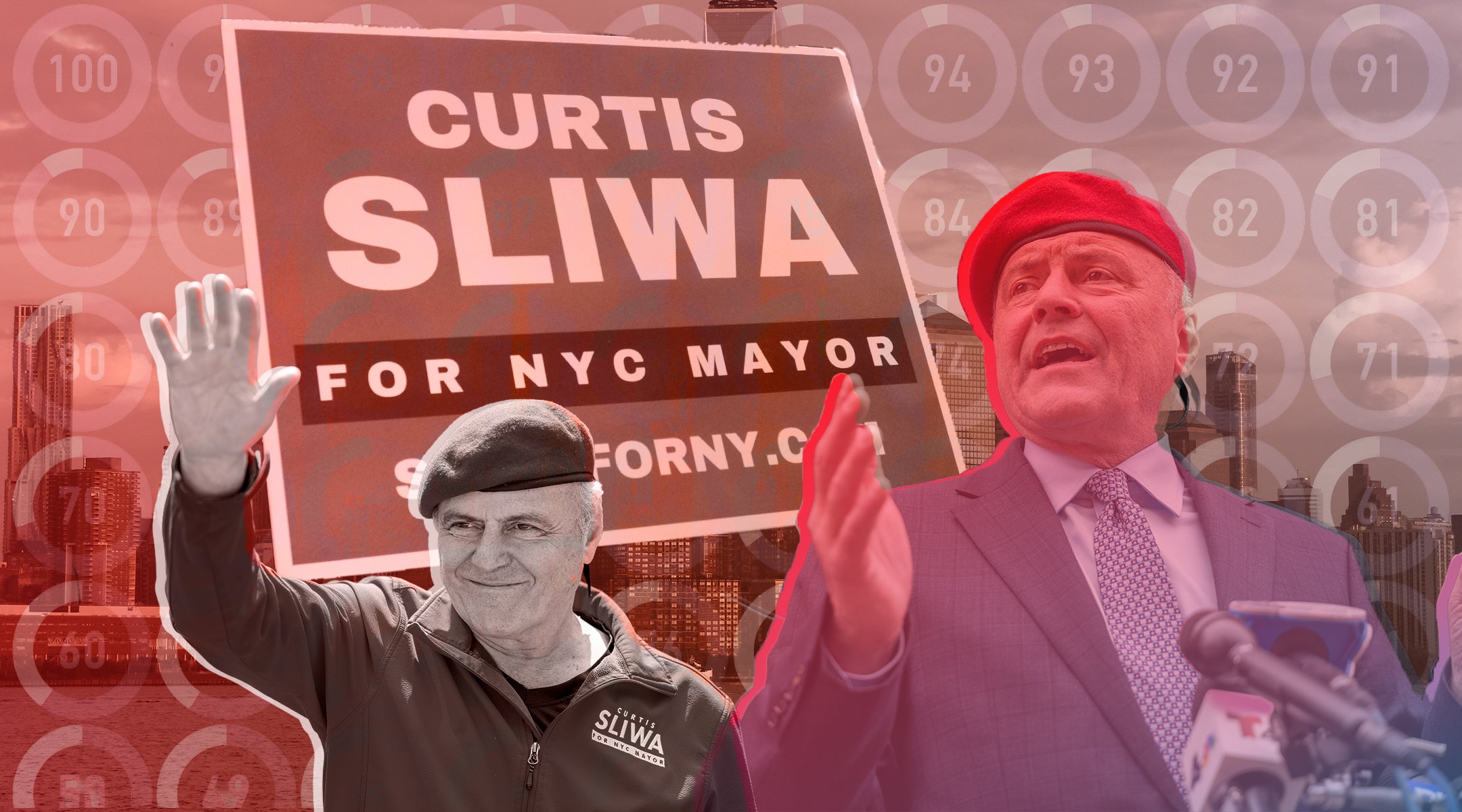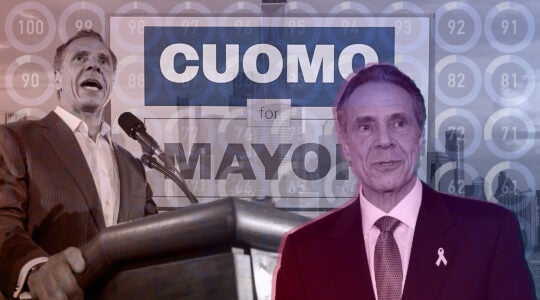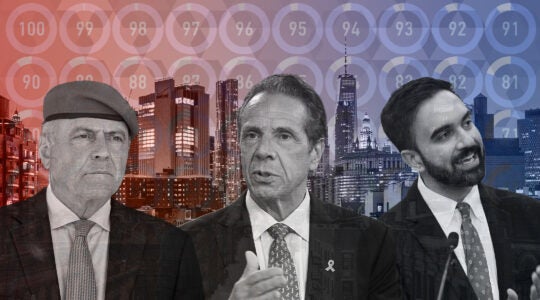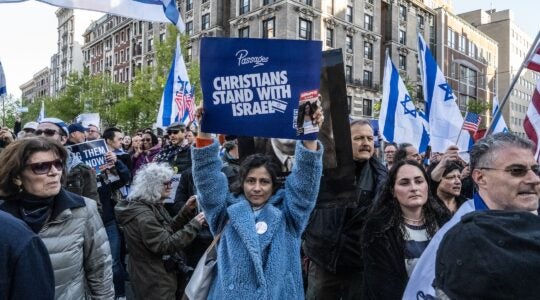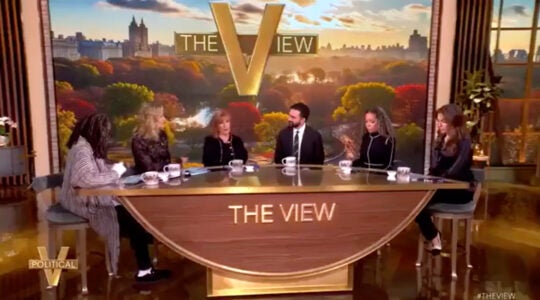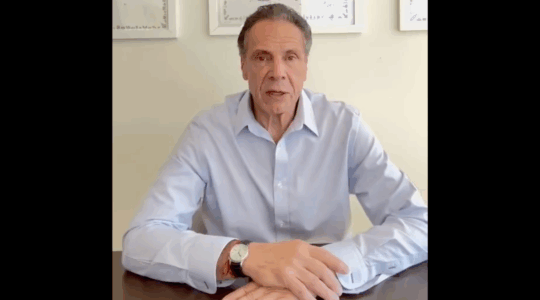Curtis Sliwa, the Republican nominee for mayor of New York City, is best known for founding the Guardian Angels — and he credits a Jewish group with inspiring the movement.
As a teenager going to high school in Crown Heights, a heavily Orthodox Jewish neighborhood, Sliwa says that he saw a group of men chasing out antisemitic gangs. That group was the Maccabees, founded by Rabbi Samuel Schrage to patrol the streets for crime in the 1960s.
“People leaving shul, running down Kingston towards Empire Boulevard, and these gangbangers were running for their lives,” Sliwa recalled in a 2021 interview with journalist Yitzi Weiner. “I said: ‘Wow, this really works! These guys are not coming back in here messing with the Lubavitchers!’”
That image remained with him until he started the Guardian Angels, a citizen patrol group on New York City subways and streets whose members wear a red beret, in 1979. It would become one of many stories about Jews in Sliwa’s public life, during which he has alternately talked about Jewish communities with admiration and disdain.
The radio host, amateur subway patroller and local celebrity is raising two Jewish sons, wearing his red beret as a kippah at their bar mitzvahs. (He and their mother, Melinda Katz, separated in 2014.) But he has also faced his share of controversies with Jewish communities, including accusations of antisemitism.
Sliwa is highly unlikely to become mayor of the overwhelmingly Democratic city. Since incumbent Mayor Eric Adams dropped out, he is now the lowest-polling candidate, trailing frontrunner Zohran Mamdani and former Gov. Andrew Cuomo by a wide margin. Still, Sliwa has cast himself as a champion for Republicans in the outer boroughs and a sizable minority of disaffected, politically homeless New Yorkers — including Jews who don’t like their other options.
We are breaking down for you what Sliwa has actually said about Jews, antisemitism, Israel and the Gaza war.
Jewish security and antisemitism
Long before Sliwa’s foray into politics, he worked alongside Jewish patrols such as Shmira and Shomrim, whose unarmed volunteers respond to emergencies in Jewish neighborhoods and assist police. He talks proudly about the Guardian Angels’ efforts to defend Chabad-Lubavitch Jews during the anti-Jewish Crown Heights riots of 1991.
While Sliwa says he would bulk up the NYPD’s personnel as mayor, volunteer groups like these are central to his vision for security — especially in Jewish communities.
“I, unlike any of the candidates, have said Jews must protect themselves,” he told the Jewish Telegraphic Agency. “If you depend strictly on Gentiles, history is replete with instances where you’re going to be horribly disappointed.” In another recent interview with the Queens Jewish Link, Sliwa said to Jews that he would not be “your Gentile mashiach,” using the Hebrew word for messiah.
The patrols that Sliwa views as key to public safety have been subjects of controversy over the years. In 2008, a 20-year-old Black man was beaten by a pair of Shmira patrollers. Another young Black man, Taj Patterson, was brutally attacked by a group of haredi Orthodox men that included members of Shomrim in 2013.
The Guardian Angels, meanwhile, have been criticized for fabricating stunts. In a 1992 interview, Sliwa admitted to manufacturing crimes and injuries for the group’s publicity.
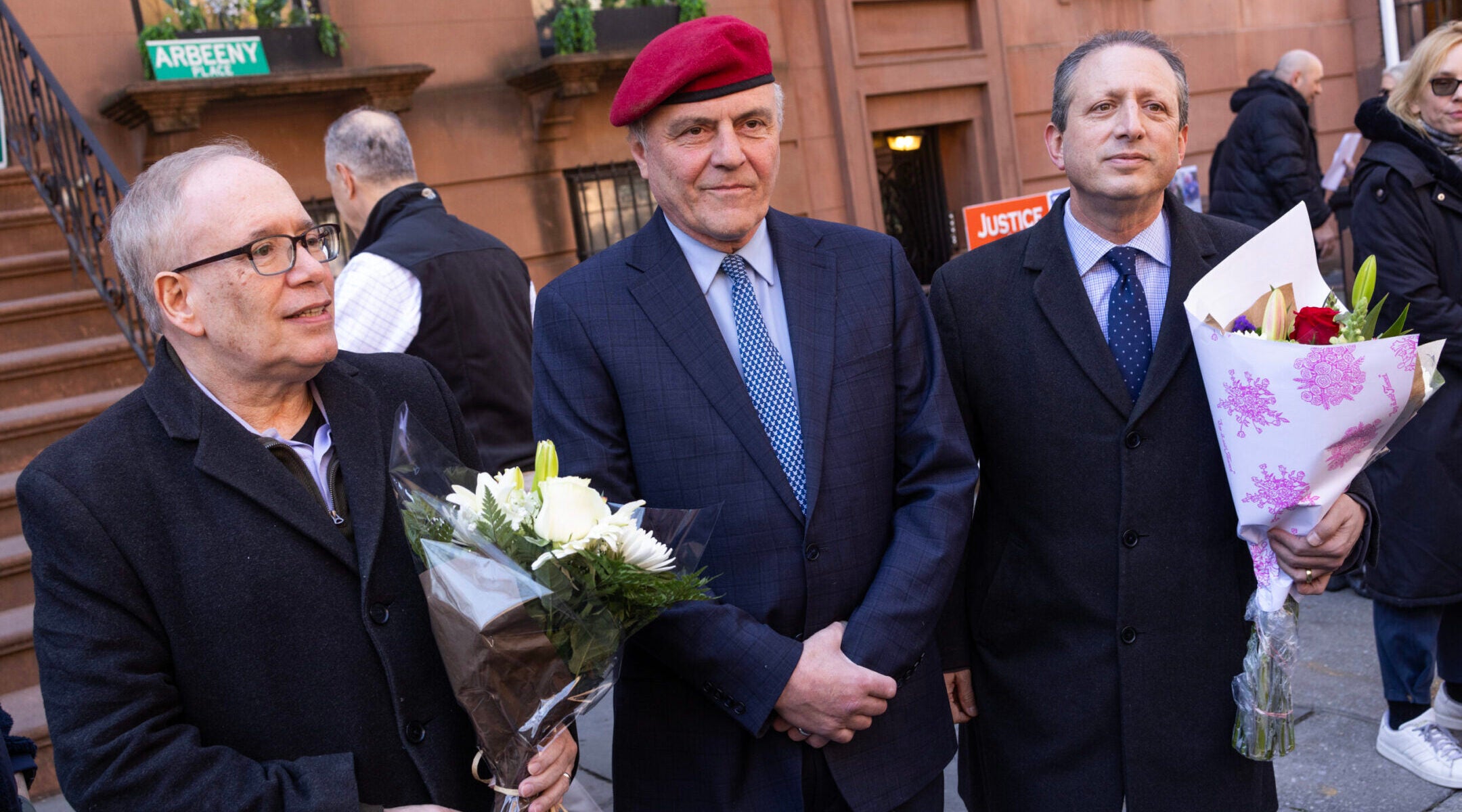
New York City mayoral candidates Scott Stringer, Curtis Sliwa and Brad Lander attend a memorial event for seniors who died during the Covid pandemic in nursing homes, March 23, 2025, in the Cobble Hill neighborhood of the borough of Brooklyn. (Andrew Lichtenstein/Corbis via Getty Images)
Sliwa told JTA that he wants to introduce students to understanding antisemitism at a young age. As a child himself, he described a fork in the road when he lost an academic award to a Jewish classmate. His uncle suggested the classmate had a deal with their Jewish teacher, but Sliwa’s father corrected him, saying, “‘Curtis, he studied a lot harder than you. Lesson? Study harder.’” Sliwa said this kind of correction should be formally implemented in schools.
“There is no curriculum that addresses the problem of antisemitism,” he said. “Me? I would do it in third and fourth grade.”
Israel and the Gaza war
Israel and its ongoing war in Gaza have loomed large over the mayoral race. Mamdani’s pro-Palestinian advocacy and staunch criticism of Israel shook up New York City politics — and in response, his opponents have proffered the support for Israel that has long been tradition across both parties.
Sliwa talks about his visits to Israel as a thread that connects him to Jewish New Yorkers. During a trip there in 1998, he was offered free rides from bus drivers who mistook him for an Israeli paratrooper with his red beret, he told the Jewish News Syndicate. He applies his theory of Jewish-led security for Jews to Israel, telling The Jewish Press, “Jews have to organize among themselves. That’s why the State of Israel came about.”
He has criticized Mamdani’s views, saying the frontrunner has “no love in his heart for the State of Israel and for Israelis.” Like other candidates, he has rebuked Mamdani for declining to condemn the pro-Palestinian slogan “globalize the intifada” during the primary. (Mamdani has since clarified he does not personally use the language and would “discourage” it because of interpretations that it could incite violence against Jews.)
Sliwa went a step further by extending his attacks to Mamdani’s Jewish supporters. “I would say the Jewish community must look internally,” he said to JNS. “Why are some of our children and grandchildren following this guy and giving him absolution and exemption when he is using the language of an antisemite?”
But Sliwa has also said that he is more focused on his “law and order” platform than foreign policy. In an interview with The Forward, he pointed out that Cuomo’s focus on antisemitism accusations against Mamdani failed during the Democratic primary, which Mamdani roundly won.
And he recently acknowledged the intensity of pro-Palestinian sentiment in New York City, citing a New York Times/Siena poll that found voters are more sympathetic to Palestinians than to Israel. In an interview with City & State, he suggested that President Donald Trump could dampen Mamdani’s momentum by brokering peace in the Middle East.
“If he can bring peace to Gaza, he can definitely take one political plank away from Zohran Mamdani, who has used that effectively during the primary and will now use it in the general campaign,” said Sliwa.
Controversies
Sliwa has clashed with Jewish New Yorkers over the years. In a 2018 speech, he described Orthodox Jews as a drag on the tax system and warned suburban residents that they were trying to “take over your community.”
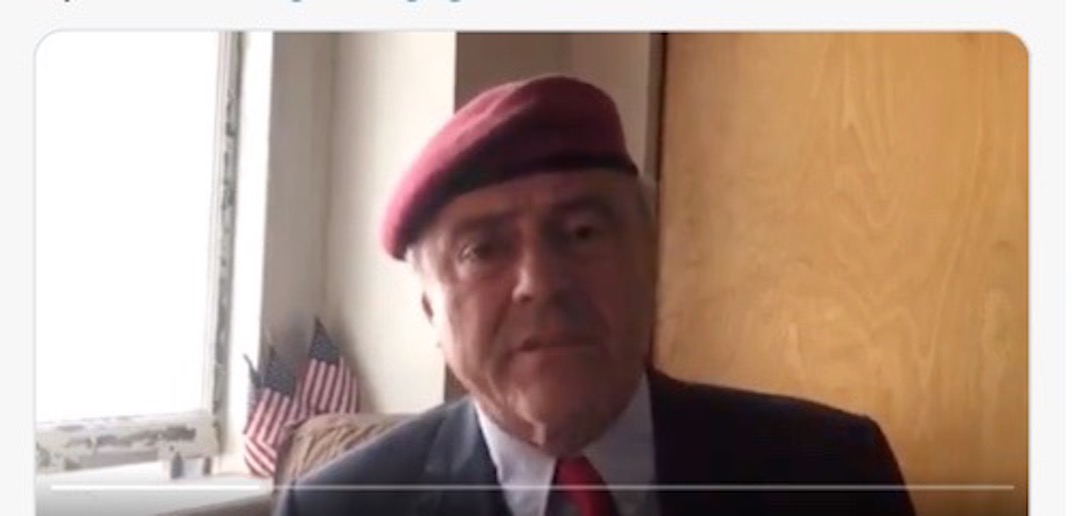
Curtis Sliwa, the Guardian Angels founder and now a New York mayoral candidate, responds in a video to accusations that remarks he made in 2018 were antisemitic, July 25, 2021. (Screenshot)
“We’re not talking about poor, impoverished, disabled people who need help. We’re talking about able-bodied men who study Torah and Talmud all day and we subsidize them,” he said in a videotaped meeting in the Hudson Valley. “All they do is make babies like there’s no tomorrow and who’s subsidizing that? We are.”
This speech resurfaced when Sliwa ran for mayor in 2021. He responded with a video in which he did not apologize or disavow his comments, but offered to meet with Orthodox leaders to “resolve our differences.”
“My two youngest sons have been raised Jewish. They need to read this? To say to themselves, my father is an antisemite? Come on, even my worst critics out there would recognize that’s a shanda,” he said in the video.
Despite his offense at being called an “antisemite,” Sliwa sparked backlash again at a 2024 event by saying that antisemitism was innate to “Gentiles.”
“It’s in our DNA,” he said at an event supporting then-presidential candidate Donald Trump in Staten Island. “I also have to hold myself back sometimes. And I have two Jewish children.” He later told JTA that he “used the wrong term” in those remarks, meaning to say that antisemitism was often “fed into the minds” of non-Jews.
JTA has documented Jewish history in real-time for over a century. Keep our journalism strong by joining us in supporting independent, award-winning reporting.
